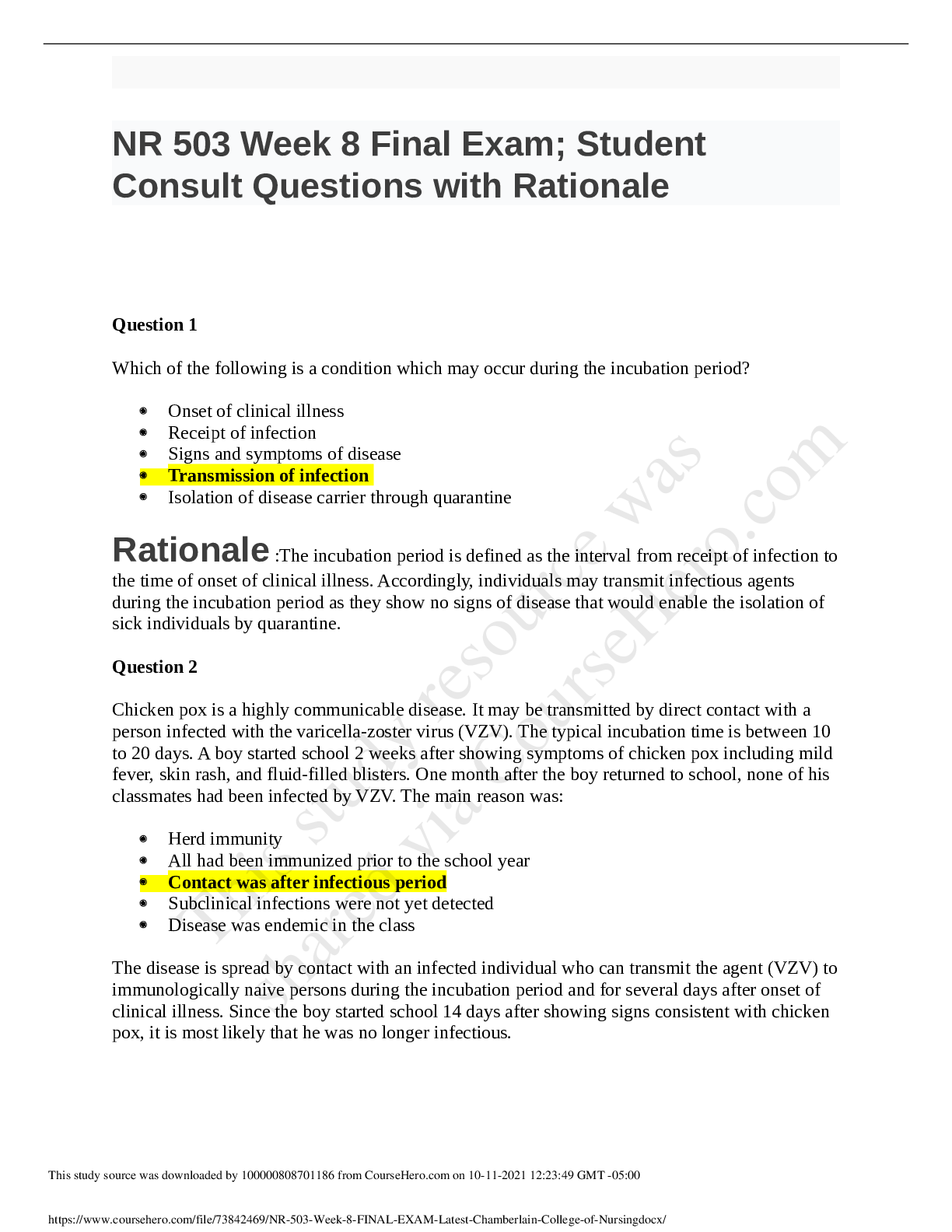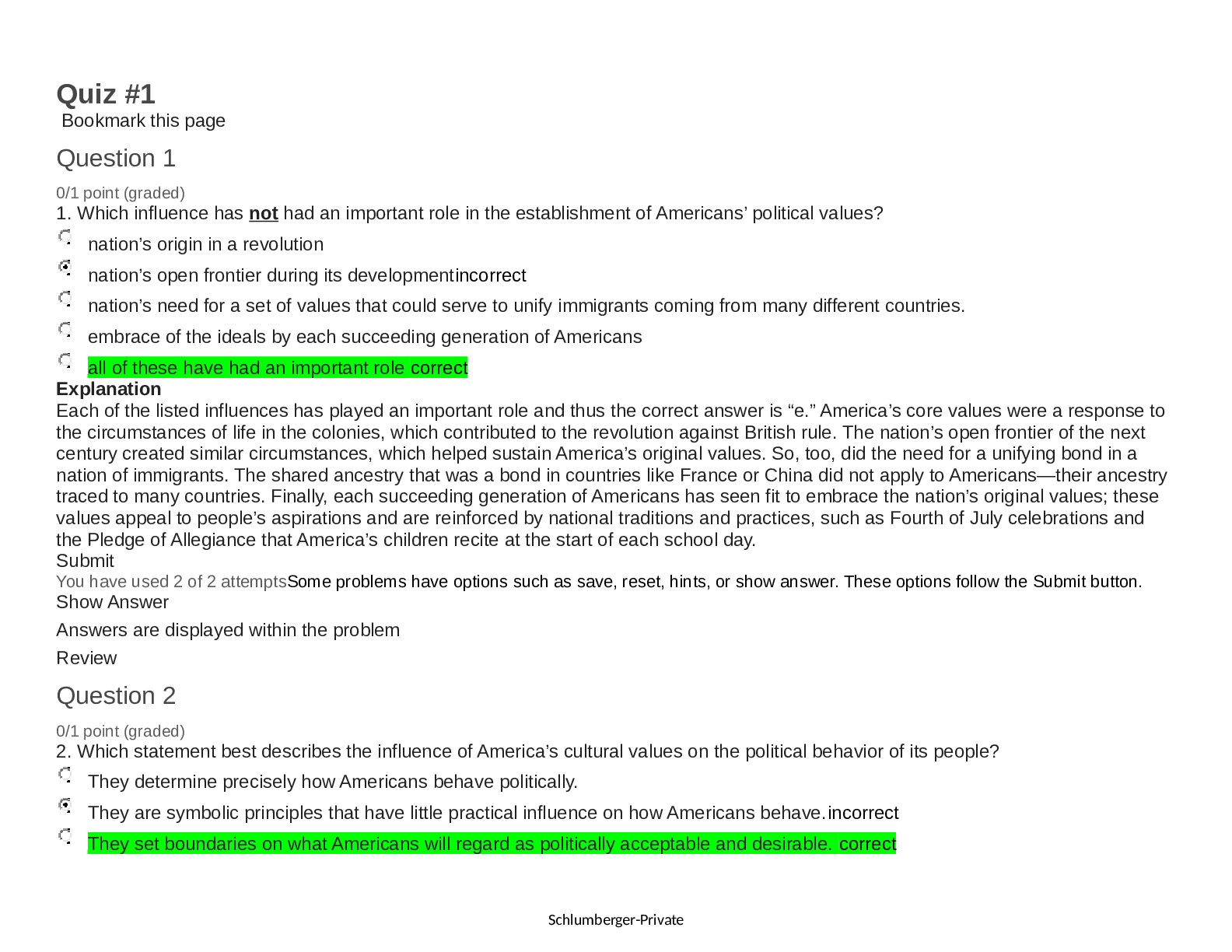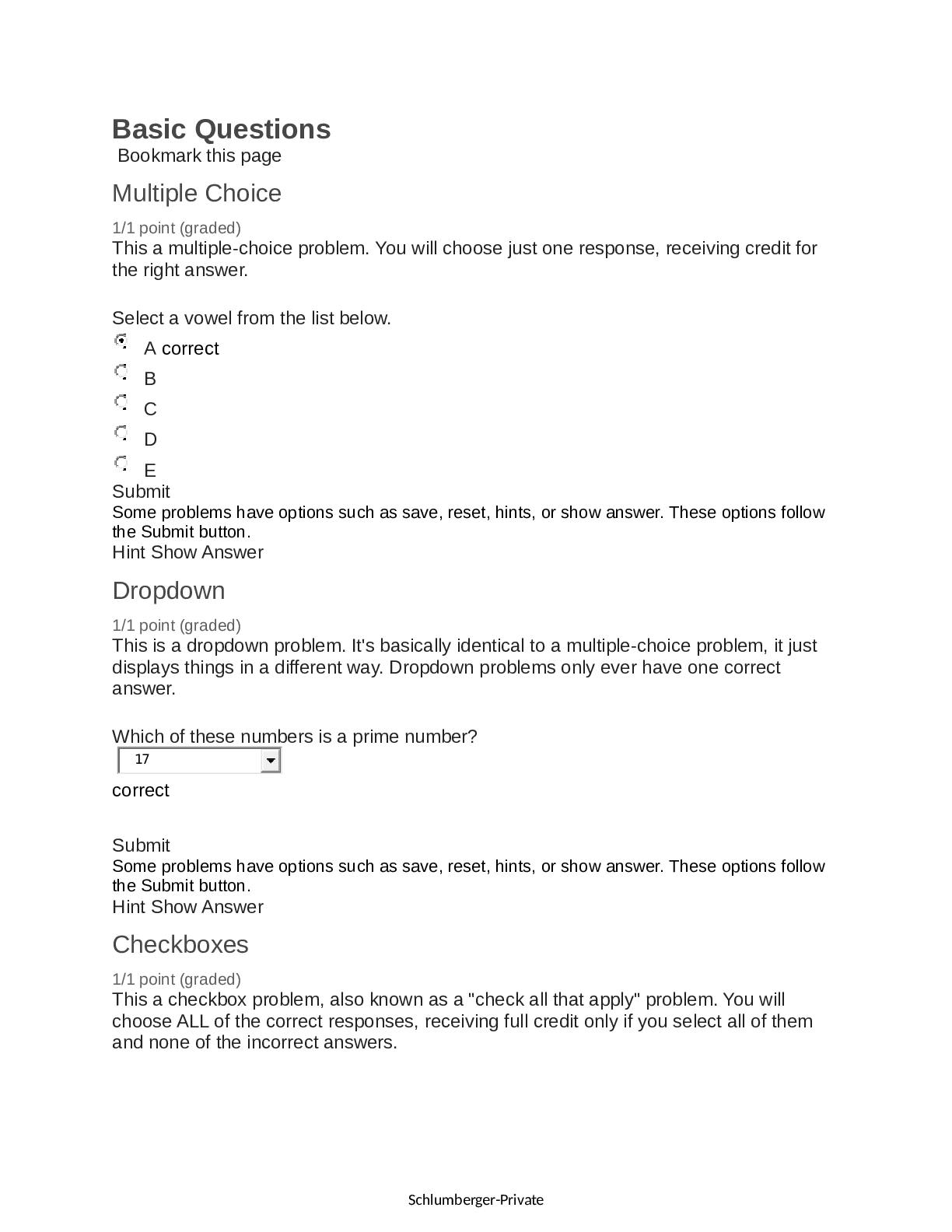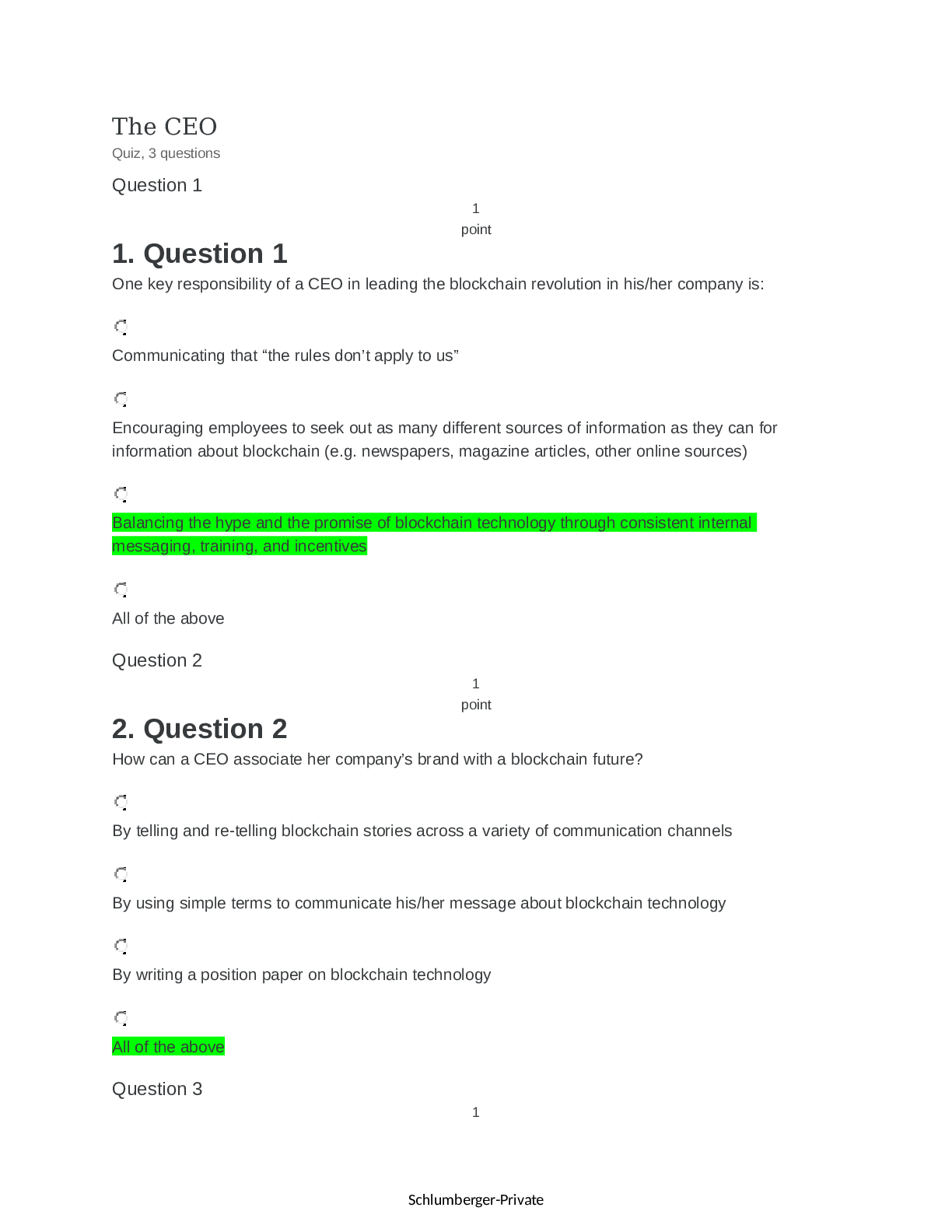Details of Business Economics & Public Policy Havard EDX Contract Law
Document Content and Description Below
Deadweight Loss Problem 1 2/2 points (graded) Vera and Vladimir live in the Arctic. Vera is an expert ice fisher, and Vladimir is an excellent hunter. Neither is any good at the other activity –... Vera is a terrible hunter, and Vladimir is awful at fishing. Vera can only ice fish in the winter, but she can freeze what she catches to eat during the summer. Vladimir can only hunt in the summer, but he can’t freeze what he kills. It’s winter, and all of the meat that Vladimir killed during the summer has been eaten or has spoiled. He’s hungry. He sees that Vera is still slowly but surely catching fish, and that she isn’t eating all of them – she’s freezing the extras. He asks her if he can have some of her extra fish, but she says no, because she needs to freeze them so she’ll have something to eat in the summer, when she can’t fish. As a result, Vladimir doesn’t have anything to eat. What is the deadweight loss in this situation? Vera is freezing her extra fish. Vladimir has nothing to eat in the winter. correct Vera won't have anything to eat in the summer. Vladimir will be unable to eat all of the meat he catches. Answer Correct: You are correct. The food is inefficiently allocated between Vladimir and Vera, so Vladimir does not have anything to eat during the winter. Why is this deadweight loss happening? Vera and Vladimir do not trust each other; therefore, Vladimir cannot make a promise to give Vera meat in the summer in exchange for fish. Vladimir cannot fish; therefore, Vladimir is going hungry. They cannot agree on a fair price for fish, therefore Vera does not want to sell her fish. They cannot trade, therefore they are unable take advantage of the surplus produced by the other. correct Schlumberger-Private Answer Correct: This is the correct answer. If Vladimir and Vera figured out a way to trade their surplus food, they could both have enough to eat throughout the year. Deadweight Loss Problem 2 2/2 points (graded) Alex and Amy are at a company dinner, where there is exactly one roll of silverware per person. Amy picks up a roll that accidentally contains two knives and no spoon, and discovers she has no way of eating her soup. Amy buttered and ate her bread. Meanwhile, Alex opens his roll to see that he has two spoons and no knife. He has some trouble buttering his bread, but he figures out a way to butter it with the spoon. This draws disapproving frowns from those around him. He has no trouble eating his soup. The dinner is very large, and Amy tries to search the room for someone with an extra spoon. But there are too many people, so she gives up. What are the deadweight losses in this situation? (Select 2 Answers) Amy could not eat her soup. Amy ate her bread. Alex made a mess buttering his bread. Amy wasted her time looking for a spoon without any success. Alex ate his soup. correct Answer Correct: Correct. If Amy had the extra spoon, she could have eaten her soup. Correct. If Alex had Amy's extra knife, he could have buttered his bread without making a mess. What is causing it? (Select 1 Answer) Each person has only one roll of silverware. Alex has made both of his spoons dirty. Schlumberger-Private The room is too large for Amy and Alex to find each other and trade. correct Scenario 1 2/2 points (graded) Albert is in the fourth grade and loves video games much more than he loves studying-- so much so that he has consistently been getting 20% on his homework assignments. Albert’s mother is concerned and tells him that she wants him to work harder in school. She bribes him, saying that she will cook Albert whatever he wants for dinner Friday night if he gets 100% on all of his homework assignments for the week. On Friday afternoon, Albert comes home from school and proudly shows his mother his last homework assignment, with yet another 100% written at the top. He then requests that a seven course steak dinner. What was the promise made? Albert's mother promised him a new video game, if he stops getting only 20% on his homework assignments. Albert’s mother promised to cook him whatever he wants for dinner Friday night if Albert got 100% on all of his homework assignments for the week. correct Albert’s mother promised to cook him whatever he wants for dinner Friday night if Albert got 100% on his last homework assignment for the week. Was there an intent to create legal relations? Why or why not? Yes, because there was bargain made between Albert and his mother. The parties have an formal relationship (mother and son) that could be considered legally binding Yes, because there was a bargain made between Albert and his mother. No, because there was no bargain made between Albert and his mother. The parties have an informal relationship (mother and son) and do not intend to be legally binding correct Scenario 2 2/2 points (graded) Reconsider the invitation to dinner with slightly revised facts. Portia does not know Professor Fried, but still wants him to attend her dinner to impress Vincent. She emails Professor Fried, introducing herself, extending an invitation to dinner, and offering to immediately pay Professor Fried $500 if he will attend the dinner. Professor Fried accepts, but again decides not to attend the dinner at the last minute. What were the promises made? Check All That Apply Professor Fried will attend dinner. Vincent will meet Professor Fried. Professor Fried will contact Portia if his plans change. Schlumberger-Private Portia will pay Professor Fried $500 for attending dinner. correct Was there an intent to create legal relations? Why or Why Not? Yes, there was an intent to create legal relations because there was a bargain between Professor Fried and Portia. correct No, there no intent to create legal relations, because there was no formal agreement between Professor Fried and Portia. Frolic and Banter? 1/1 point (graded) The law won't enforce contracts that are merely "frolic and banter" -- that neither side takes seriously. Why do you think that is? Please choose the option you think is best, and explain your reasoning in the discussion below. Courts do not like being in the business of determining what is a joke and what is not, so the burden should be on the people making the agreement to make it clear that the agreement is not a joke. correct People should be free to be silly without fear of legal retribution. It would be ridiculous for courts to enforce contracts meant as jokes, and society wouldn't stand for it if courts tried to enforce them. Other reason (please explain in the discussion below) Legally Enforceable Contracts? 3/3 points (graded) Which of these three situations could be a legally enforceable contract? Read through each situation and decide for yourself. You and your father have been discussing Bill, a friend of yours whom your father has always considered quite dimwitted. You defend Bill's drive, capabilities, and prospects at his new job, but your father says to you, "If Bill ever gets promoted, I'll give you a million dollars." Is this a situation that can be a legally enforceable contract? Yes No correct You are a fan of Argentina's soccer team and your friend is a fan of Germany's. After heatedly discussing the strengths and weaknesses of the two teams for 45 minutes, you each make a bet with the other that if your team wins the World Cup, the other will pay Schlumberger-Private you $500. You shake on it, and (laughing because you think your friend is going to end up paying you a lot of money) write down a short agreement on a napkin, which your friend signs. Is this a situation that can be a legally enforceable contract? Yes correct No You and your cousin decide to take a trip to Florida together. You've been calling each other to plan the details of your flights and hotels for weeks, and you agree that you will buy the plane tickets and she will reserve the hotel. After you reserve and pay for both tickets, your cousin cancels on you and refuses to pay because she found out you had made some disparaging remarks about her housekeeping skills a couple of years ago. Is this a situation that can be a legally enforceable contract? Yes correct No Scenario 1 1/1 point (graded) Mike has just received a job offer from Delivery Services, Inc. The employment contract Delivery Services gives to Mike includes the following clause as a description of Mike’s duties: EMPLOYMENT CONTRACT FOR NIGHT DRIVER The undersigned employee (“Employee”) shall work for Delivery Services, Inc. (“Company”) as a night driver in the state of Ames, relieving day drivers to drive a company truck on the package delivery routes designated by the Company between the hours of 10 p.m. and 6 a.m., Eastern Standard Time. The Company shall compensate the Employee $50 for each hour of work and shall ensure that the Employee is scheduled for at least three shifts a week. The state of Ames, extremely troubled by the large number of car accidents that have been occurring at night, recently passed a regulation outlawing any person from driving between the hours of 9 p.m. and 7 a.m. each day. Mike signs and returns his employment contract to Delivery Services, Inc., but the company refuses to give him any shifts after learning of the regulation. Schlumberger-Private If Mike sues Delivery Services, Inc. for enforcement of the contract, what is the result? He would win the lawsuit. The agreement is both legal and moral. Delivery Services Inc. guaranteed at least three shifts each week between the hours specified. He would win the lawsuit. The agreement is both legal and moral. Delivery Services Inc. is obligated to provide alternative work. He would lose the lawsuit. The agreement is illegal but moral. Delivery Services Inc. is not obligated to perform its duties under the contract. correct Which scenarios are enforceable bargains? 1/1 point (graded) Read the scenarios presented below, and select the ones you believe to be enforceable bargains that the law will stand behind. (Select 2 Answers) A) Caroline tells her sister Jean that if Jean will run Caroline's business for a month while Caroline is away on vacation, Caroline will make the down payment on a new car for Jean. Jean has wanted a new car ever since she got her Driver's License. B) Mickey promises his son Michael, while he is dropping him off at his first day of college, that Mickey will give him $200 of spending money every month. C) A grandfather tells his granddaughter that if she quits her job, he will provide her with an income. D) Elsa promises her nephew Edgar that if he leaves his job to go back to business school, she will pay his expenses for the two years he is in school, as long as he chooses to attend a school in Boston, where Elsa lives, and agrees to visit Elsa once a week. correct Scenario 1 2/2 points (graded) Beth gets the following email from her best friend Anne: On Thursday, April 3, at 2:52 PM, annelovescookies@email.com wrote: Oh my gosh, Beth, I NEED your help. I forgot that I am hosting a party for my niece’s graduation this weekend. I don’t have any sort of food arranged. Because you are such an incredible baker (and the greatest friend in the world), would you be able to bake 100 assorted cookies for the event? I know it’s a huge favor, but I would be eternally grateful and would pay you $1,000,000 or whatever else your heart desires. Schlumberger-Private If Beth responds, agreeing to bake the 100 cookies, can she hold Anne to her side of the bargain? Yes No correct Why or why not? Apply the principles Professor Fried has discussed thus far. Which two principles are most relevent to this case? Is there an Intent to Create Legal Relations? Are Both Sides Serious? Is this a Gift or a Bargain? Is this a Legal and Moral contract? Multiple Choice 0/1 point (graded) Why did Mrs. Demotsis argue that this was not an enforceable bargain? The exchange rate was awful. Mrs. Demotsis proposed the exchange and Mr. Batsakis agreed to it without asking for any additional terms, so there was no bargaining. Mr. Batsakis hadn’t given the drachmae in exchange for anything, so this was a gift. The two parties hadn’t intended to create legal relations. Multiple Choice 1/1 point (graded) The court decided that Mrs. Demotsis and Mr. Batsakis’ deal was a bargain (although maybe a bad one). What was Mr. Batsakis compensated for? A. Bargaining expenses B. Compounding interest from the date he made the loan to Mrs. Demotsis C. Risk correct D. Litigation expenses Drag and Drop 1/1 point (graded) Schlumberger-Private Is an auction a fair way to settle on a price for something? Which details might imply that an auction is fair or unfair? Label each detail using fair or unfair. Detail Fair or Unfair? Advertising the Auction in a populous city correct Advertising the Auction in a deserted area correct Holding the auction in a deserted area correct Holding the auction in a populous city correct Limited number of bidders correct Sellers Designating a minimum bid price for their items correct Winning bid is much less than the item’s actual value correct Numerical Input 2/2 points (graded) General Average Problem You’ve just learned about the concept of general average. Try applying it to the following hypothetical: Fair Unfair Unfair Fair Unfair Fair Unfair Schlumberger-Private A cruise ship docks close to Rome for three days, giving the passengers plenty of time to shop and take in the sights. Unfortunately, the passengers are a bit overzealous in their purchases and fill the ship’s cargo beyond capacity. The ship’s cargo is worth $100,000. Amanda, one of the passengers, spent the full three days shopping in the stores along Via Condotti, Rome’s most fashionable street. Her cargo is valued at $20,000. Barry, another passenger, spent his three days filling a suitcase with keychains from souvenir stores. Barry’s cargo is valued at $200. To save the ship from sinking, the captain must throw cargo overboard. He begins with Barry’s suitcase and continues until the ship is no longer in danger, discarding $50,000 worth of cargo. Amanda is relieved—all of her designer clothes managed to survive the captain’s purge. Barry, however, is devastated—he had planned to add those keychains to his growing collection at home, which nearly fills the garage. Use the rule of general average to calculate the net cargo value Amanda and Barry will each receive when the ship docks. Please only enter your number without $ , or . Amanda correct 10000 Barry correct 100 Label the Elements 5/5 points (graded) Think about the cases of Jonah and the Whale (general average) and Batsakis v. Demotsis. What do we learn about bargains? Which of the following, makes a good or happy bargain between two parties? What about a sad bargain? Label each element of a bargain below. Element Good Bargain or Sad Bargain? Allow some parties to benefit from pure luck correct Spread Risk Proportionately correct 10000 100 Sad Bargain Good Bargain Schlumberger-Private Take into account special and changing circumstances correct Have unequal exchanges (something for nothing) correct Take into account risk correct Comprehension Check 1/3 points (graded) In Batsakis v. Demotsis, the circumstances that lead to the agreement were no fault of either party. In this case, who caused the difficulties that led to this bargain? The Boyfriend and His Associates correct The Boyfriend's Associates incorrect The man who caused the car accident No particular party was at fault Answer Incorrect: The boyfriend's associates were not the only parties to complicate this bargain. Explanation By contrast to Batsakis v. Demotsis, in the Car Accident, her boyfriend and his associates had caused the difficulties that led her to make the deal. The correct answer is boyfriend and associates, not just boyfriend. In Post v. Jones, we learned about what makes a good bargain. When the woman sold her annuity, was this a good or bad bargain? Why? Good Bargain: The boyfriend's associates paid a lower price to account for the risk that they might not be paid. Good Bargain: The woman received a fair price for her annuity. Bad Bargain: The bargain was unequal, because the woman got nothing in exchange for the lower price she was paid. correct Bad Bargain: The boyfriend's associates benefitted from pure luck. Answer Good Bargain Sad Bargain Good Bargain Schlumberger-Private Correct: Correct. The bargain was unequal because the associates paid far less than the annuity was worth-- she got nothing in return. Based upon your answer to the two questions above and what you know from Batsakis v. Demotsis, how do you think this case worked out? Why? The contract was enforceable, because both parties were serious about this bargain and intended to create legal relations. The contract was enforceable, because neither party was at fault for the circumstances and the value paid was fair. The contract was unenforceable, because the boyfriend's associates benefited from pure luck when the woman sold the annuity for less than it was worth.incorrect The contract was unenforceable, because one party was at fault for the circumstances and the price paid was unfair. correc [Show More]
Last updated: 2 years ago
Preview 1 out of 91 pages
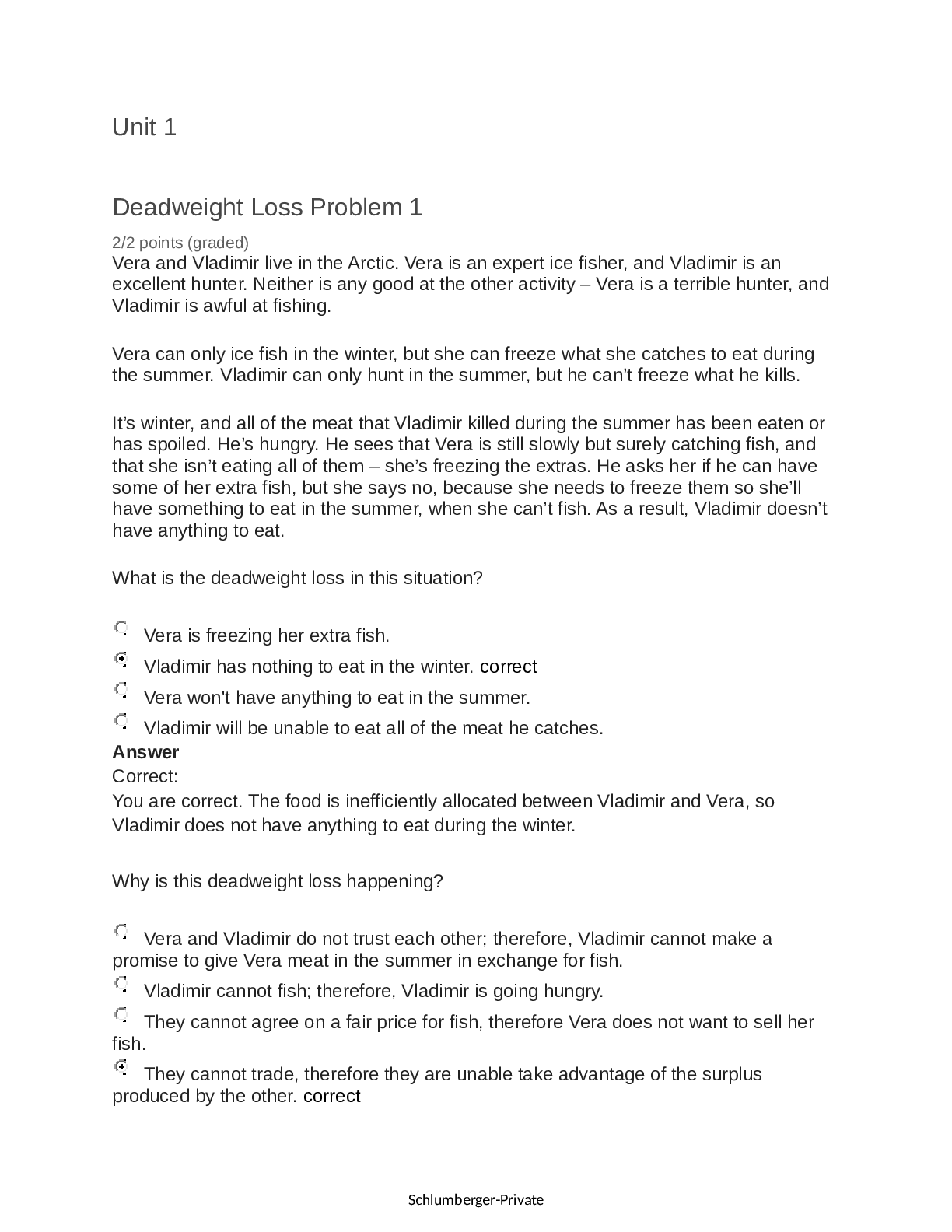
Buy this document to get the full access instantly
Instant Download Access after purchase
Buy NowInstant download
We Accept:

Reviews( 0 )
$18.00
Can't find what you want? Try our AI powered Search
Document information
Connected school, study & course
About the document
Uploaded On
Oct 16, 2021
Number of pages
91
Written in
Additional information
This document has been written for:
Uploaded
Oct 16, 2021
Downloads
1
Views
533

